
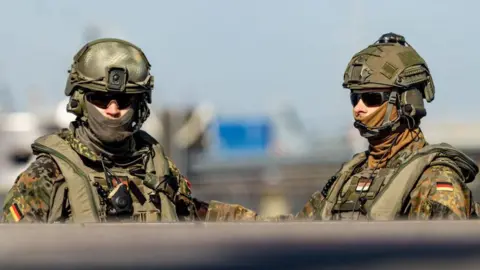 AXEL HEIMKEN/AFP
AXEL HEIMKEN/AFPMysteriously found holes in fences of military bases.
An alleged plot to assassinate Germany’s leading arms manufacturer.
Telephone intercepts during a high-level Luftwaffe call.
These are not plots taken from a 1960s spy novel, but from real events that happened in Germany this year.
Not all of these events can be definitively attributed to Moscow, but Germany is on high alert for possible acts of sabotage by Russia, due to Berlin’s continued military support for Kiev.
As the hot war between Russia and Ukraine rages, there are fears that Europe has slipped into a new Cold War.
“When we think of the Cold War, we tend to think of the 1970s, when the rules of the game had already been established and accepted,” says Mark Galeotti, senior research fellow at the Royal United Services Institute (RUSI) and director of Mayak Intelligence.
“In a way, we’re at the beginning of the Cold War, in the 1950s and 1960s, so it was a much more raw time.”
But what does a reignited Cold War mean for Europe’s largest economy and a country that was once itself divided in two by the Iron Curtain?
The biggest bombshell was dropped just last month, when CNN reported that US officials had informed Berlin of an alleged Russian plot to kill the CEO of Germany’s largest arms company, Rheinmetall.
The Kremlin denied the reports, but German Foreign Minister Annalena Baerbock, who seems like a hawk next to the more hesitant Chancellor Olaf Scholz, attacked Russia for “waging a hybrid war of aggression.”
I met Rheinmetall CEO Armin Papperger at the groundbreaking ceremony for a new munitions factory in February.

 by RONNY HARTMANN/AFP
by RONNY HARTMANN/AFPThe 61-year-old is, to use a vulgar term, a real “somebody”, especially in a world where NATO countries spend billions to supply Ukraine and strengthen their own security.
His prominent position was clear when, alongside Chancellor Scholz, Defense Minister Boris Pistorius and Danish Prime Minister Mette Frederiksen, he planted spades in the earth of Lower Saxony.
If a plot to kill him had succeeded, the West would have been shocked.
Shortly thereafter, a security lapse allowed spies to intercept a highly classified conversation between senior German Air Force officials, which was later broadcast on Russian television.
It was a source of great embarrassment for Berlin, as a Luftwaffe brigadier general appeared to allow spies access to the secure call by calling an unsecured line.

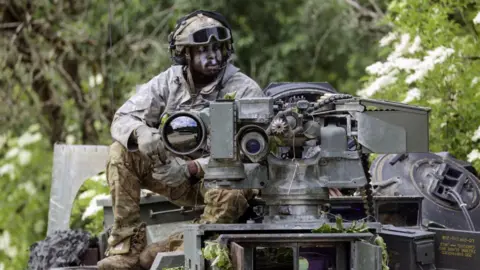 Alex Kraus/Bloomberg
Alex Kraus/BloombergThe mega-incident, though isolated, has fueled accusations that Germany has long been a “weak link” in European counterintelligence due to a fragmented and federalized system underpinned by a strong emphasis on individual privacy.
Weeks later, two German-Russian citizens were arrested on charges of plotting to sabotage U.S. military facilities in Bavaria. Annalena Baerbock summoned the Russian ambassador to complain and announced: “We will not allow Putin to bring his terror to Germany.”
Just last week, holes were found in the fences of water systems supplying two military bases in North Rhine-Westphalia, raising fears that someone may have tried to contaminate the supplies.

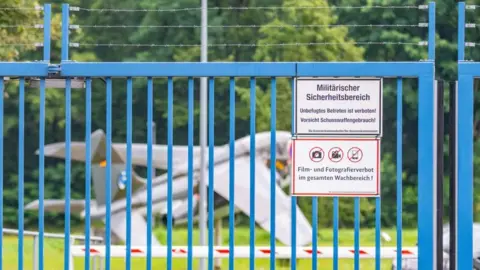 BENJAMIN WESTHOFF/EPA-EFE/REX/Shutterstock
BENJAMIN WESTHOFF/EPA-EFE/REX/ShutterstockGermany is not the only European country targeted by apparent acts of sabotage, but it is home to numerous US military bases, established after World War II.
Mark Galeotti believes that Moscow views Germany as a great but “flaccid” power, which makes it the ideal pressure point.
By anyone’s count, the largest known act of sabotage to hit Germany in recent years was the explosion of the Nord Stream gas pipelines, which run under the Baltic Sea from Russia, in 2022.
Speculation has since spread about who ordered the attack, but in a dramatic development, Germany has now issued an arrest warrant for a Ukrainian diving instructor.
Last week, the Wall Street Journal reported that Operation Shoestring had been privately funded but overseen by Ukraine.
Kiev dismissed the report as nonsense, and while there has always been skepticism that President Putin would order the destruction of his pipeline, it shows that the murky world of espionage can be full of twists and turns.

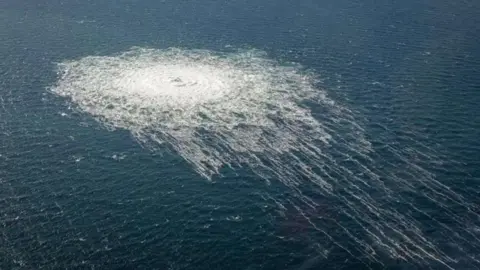 Danish Defence Flyer
Danish Defence FlyerNot a single episode of apparent sabotage can in any way be immediately and with certainty attributed to Russia.
In France, it was far-left activists, not Russian agents, who were accused of targeting the country’s high-speed rail network on the eve of the Olympics.
Germany also has a long history of attacks by far-left militants.
The fact that Ukrainian figures are now in the spotlight over the Nord Stream explosions has fueled renewed criticism from well-known political circles within Germany about the government’s support for Kiev.
Alice Weidel, co-leader of the far-right Alternative für Deutschland party, called for “aid payments” to Kiev to be suspended and for damages to Nord Stream to be “billed” to Ukraine.
The AfD enjoys much of its support in former communist East Germany, where, beyond Berlin, one is more likely to find lingering affection for Russia and dissatisfaction with the mainstream parties that have dominated national politics since reunification.
While Cold War comparisons loom over European security, in Germany too, the politics of that period have undergone a marked and unexpected transformation.
In an effort to strengthen security, the German government is working on a new law aimed at increasing the resilience of critical infrastructure.
German Interior Minister Nancy Faeser says “maximum protective measures must be taken in all areas.”
Operators in critical sectors such as energy, transport and water will have to comply with minimum safety standards, under the Kritis Umbrella Act.
It is the first federal law of its kind in Germany, but has yet to gain final approval, despite growing war-related tensions.
German-made Marder armored vehicles are reportedly being used in Ukraine’s surprise operation inside Russian territory.

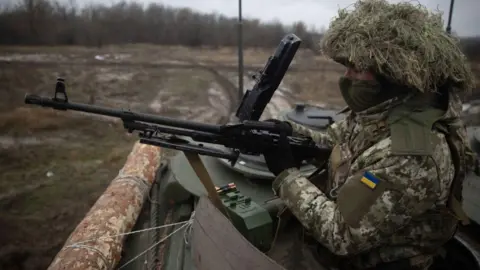 Roman Chop/Global Images Ukraine
Roman Chop/Global Images Ukraine This would mark yet another German foreign policy taboo broken following Russia’s full-scale invasion of Ukraine.
Add to this the controversial US plan to deploy long-range missiles in Germany starting in 2026.
When Russia’s full-scale invasion of Ukraine began, Chancellor Sholz promised a “Zeitenwende”, or a turning point in national defense and security policy.
But both supporters and critics of the government acknowledge that reversing years of underinvestment in defense will take time, as will adapting a mindset so influenced by Germany’s dark past.
Given recent developments, there is a question mark over how much time Berlin has.
Mark Galeotti argues that it is not just about rebuilding the defense, but also about strengthening cybersecurity and improving counterintelligence.
“Security planning doesn’t take weeks or months, but years.”





